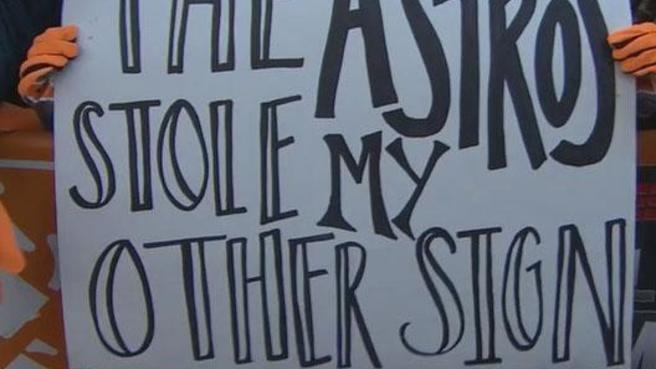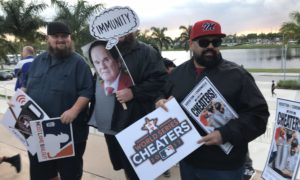Are the Houston Astros the New England Patriots of Baseball?

The New York Yankees, once famously labeled the “Evil Empire” by then-Red Sox president and CEO Larry Lucchino, may yet be the most-hated franchise in baseball. With their recent scandals, however, the Houston Astros are giving them a run for their money.
In a bit of news Major League Baseball can’t have wanted after a closely contested and highly viewed World Series, the Astros and the league are embroiled in a cheating scandal. The Astros apparently stole signs using outfield cameras in 2017, the year they won the World Series.
Former Astros pitcher Mike Fiers served as whistleblower in confirming suspicions recently to The Athletic that the club electronically relayed footage to a television below the dugout. From there, individuals could alert the batter as to what pitch was coming. Sometimes, they audibly banged on a trash can to signify that an off-speed pitch was on the way. Speaking of the Yankees, they made their own accusations about sign-stealing tactics from this year’s postseason, accusing Houston of using everything from whistling to flashing lights to tip off batters.
Along these lines, the depth and breadth of the Houston Astros’ chicanery may only be hinted at in what Fiers leaked. Investigators and eagle-eyed baseball fans are likely probing past footage for additional evidence of foul play as we speak. However, what we know already points to a serious problem for baseball. Simply put, Houston’s supposed misdeeds are not in the spirit of fair play. Furthermore, they suggest a disturbing pattern of behavior for an organization that is one of Major League Baseball’s most successful in recent memory.
The Houston Astros, you may recall, are facing this scandal on the heels of a separate controversy. That PR storm involved former assistant general manager’s Brandon Taubman’s inappropriate comments to a group of female reporters following the team’s clinching win in the ALCS. Taubman, seeming to taunt the reporters and mock domestic violence survivors, repeatedly referred to the Astros’ signing of Roberto Osuna. That itself was a questionable move following the reliever’s suspension for violating the league’s domestic violence policy.
To make matters worse, Astros management initially responded by issuing a tone-deaf denial of Taubman’s antics only to end up dismissing him. In the wake of the incident and Taubman’s firing, numerous reports of a “toxic” work environment within the organization surfaced, citing insider accounts. Houston’s dilatory reaction to the Taubman controversy on top of mixed messaging relating to Osuna’s addition to the roster (i.e. having a “zero tolerance” policy but still believing in second chances) lend real credence to this characterization of toxicity.
This is also not the first time the Houston Astros have been involved with purported attempts at espionage, so to speak. During the 2018 postseason, the Cleveland Indians and the Boston Red Sox suspected the Astros of having a man with a cell phone in the camera well to monitor their dugouts. According to the accused, they were simply using such measures to make sure the other teams weren’t cheating. Of course, Boston’s complaint was not without a vague sense of irony as the Yankees caught them back in 2017 stealing signs and relaying them to the dugout using an Apple Watch. To this end, it helped make the Astros’ 2018 cell phone defense at least somewhat plausible.
This recent history all adds up to the Astros seeming a lot like another sports franchise, which has found controversy alongside on-the-field success of late. The New England Patriots have won the Super Bowl six times since the year 2000. In doing so, they have become synonymous with excellence, but not without scandal. In 2007, NFL Commissioner Roger Goodell disciplined the Patriots for videotaping opposing defensive coaches’ signals from an unauthorized location. More recently, Deflategate saw Patriots quarterback Tom Brady suspended for four games for events related to equipment managers purposely deflating game balls to gain a competitive advantage.
The true extent of both controversies remains murky. With Spygate, there is the sense that the magnitude of New England’s wrongdoing may have been greater but that Goodell ended the investigation as a concession to team owner Robert Kraft. Regarding Deflategate, alternative science-based theories have advanced the notion the league’s punishment of Brady and the Patriots was, ahem, inflated. Either way, these “-gates” have stuck with head coach Bill Belichick and Co., especially among non-Patriots-fans. Television announcers and past players alike may gush about the team’s consistency and the “Patriot way” of managing off-field newspaper fodder. But this does not negate the ill will the club has generated.
This comparison is not a one-off either. Greg Rajan of the Houston Chronicle identifies both the Astros and Patriots as “sports villains,” with the accompanying side-by-side photos of Astros GM Jeff Luhnow and Belichick as the faces of dirty deeds. Ben Frederickson of the St. Louis Post-Dispatch asks and answers the question “Astros Becoming the Patriots of Baseball?” in the affirmative. Heck, Shane Ryan of Golf Digest penned an article on the Astros giving the Pats a challenge for “most loathsome franchise.” These two organizations’ unlikability transcends mere football and baseball fandom.
Then again, this unlikability may be inextricable from these clubs’ good fortunes. The Houston Astros figure to be the team to beat in the AL West, if not the entire American League, again next year. The New England Patriots have essentially had a stranglehold on the AFC East for the last 15 years to accompany their six championships. Both teams have elevated their status from that of divisional cellar-dwellers to perennial title contenders.
In addition, both the Astros and Patriots have an evidently preternatural ability to put anyone in one of their uniforms and have him excel. After Houston was finished with Charlie Morton, they transformed him from a middling pitcher to a Cy Young caliber hurler (But that transformation may have started in Philadelphia). New England has cycled through undervalued receivers like Wes Welker, Danny Amendola, Chris Hogan, and Julian Edelman (the Patriots drafted Edelman, a college QB, as a receiver) who fit a similar profile. It’s not either franchise’s fault that they’re good at recognizing talent.
Haters gon’ hate. Sure, the Astros and Pats fans may chirp that they “can’t see” said haters. Plus, there’s the popular notion “if you’re not cheating, you’re not trying.” Still, these attempts to game the system sully what otherwise might be considered model behavior. The Houston Astros and New England Patriots have reached the pinnacle of their respective sports by assembling some of the best talent. They shouldn’t need to use underhanded methods to push them over the top. We’re in an era in which star players have likened the very baseball to something out of a video game. For the Astros and baseball, these scandals can eat away at public trust in the final product.
This business is, in a word, frustrating. For many of us, it was especially galling. I felt compelled to root for the Washington Nationals, a division rival of my New York Mets, over the Astros in this year’s World Series. That the Nats ultimately pulled it out produced only a small sense of satisfaction in me. For others reveling in the Astros’ defeat, it was the apparent work of sports karma to be celebrated instead.
Not everyone is convinced the Houston Astros becoming a “villain” is necessarily a bad thing for Major League Baseball. Greg Rajan believes that the hubbub surrounding what some are calling “Signgate” is a positive development. That is, it’s a boon to a sport which often plays second fiddle or worse to other professional sports. He writes:
The Astros didn’t win the World Series, but they have given Major League Baseball something it may have needed this offseason.
The allegations of high-tech sign stealing have made the Astros baseball’s new villains. The Yankees? They haven’t even been to the World Series in a decade, so it’s hard to get in a lather over them these days. But the Astros have helped a sport often derided (incorrectly, mind you) as boring generate offseason headlines missing in recent years as the Hot Stove League barely reached a boil.
Rajan does make a valid point that the old “Evil Empire” isn’t quite what it used to be. With 27 World Series titles under their belt—and keen to remind the rest of Planet Earth about it—the NY Yankees are always going to have their detractors. Still, the Yanks haven’t won a championship since 2009.
What’s more, this past season’s version of the Yankees was—dare I say it—not easy to hate. Owing to injuries, only five Yankees posted more than 400 at-bats for New York in 2019. On top of that, they weren’t the names many would’ve expected.
DJ LeMahieu, expected to serve a utility role after being signed as a free agent in the offseason, led the team in batting average (.327), RBI (102), and hits (197). Gleyber Torres paced the club in home runs (38) and capably split time between second base and shortstop. Brett Gardner at 35/36 years old, led the Yankees in steals (10) and recorded the most at bats among their outfielders. Gio Urshela, traded from the Toronto Blue Jays for cash, had a career year at the plate and was worth more than 3 wins. Even Luke Voit, a reclamation project from the St. Louis Cardinals, had his moments. These weren’t household names leading the charge, but Aaron Boone’s “savages” ran away with the AL East in gritty fashion. Simply put, they weren’t your typical “Bronx Bombers”—and it was weirdly refreshing.
So, what do we make of Rajan’s assertions? Do we need a villain like the Houston Astros in Major League Baseball? As far as baseball is concerned, is all publicity good publicity?
Rajan may hold a bit of bias. One can’t help but think he is giving his hometown team an awful bit of latitude here. Sure, the Astros and Major League Baseball are generating hits with this controversy, remaining relevant through one of baseball’s slowest months. They’re just doing so for the wrong reasons. MLB commissioner Rob Manfred has vowed a “really thorough investigation” into the Astros’ sign-stealing practices and hinted discipline could be worse than in previous instances of cheating. This comes after the Astros organization promised an investigation into its own affairs. ESPN’s Buster Olney, for one, is not optimistic about the outcome of such an inquiry. Based on the league’s history of slaps on the wrist for similar offenses, we might share his lack of enthusiasm.
Yes, the Houston Astros have brought additional interest to this baseball offseason independent of free agency. But, they’ve also now undermined confidence in the fairness of the game. Coupled with the apparent baseball shenanigans, baseball’s new reality is especially unlikely to generate excitement from a values-driven younger audience. Rob Manfred should exercise his broad authority to make an example of the Astros. Perhaps not to the extent that MLB vacates the 2017 World Series, but a suitable punishment nonetheless. In the likely event the league fails to assess more than a token fine, though, it should bear the blame along with the new self-professed “apex predator” of the American League.
-Joe Mangano




















